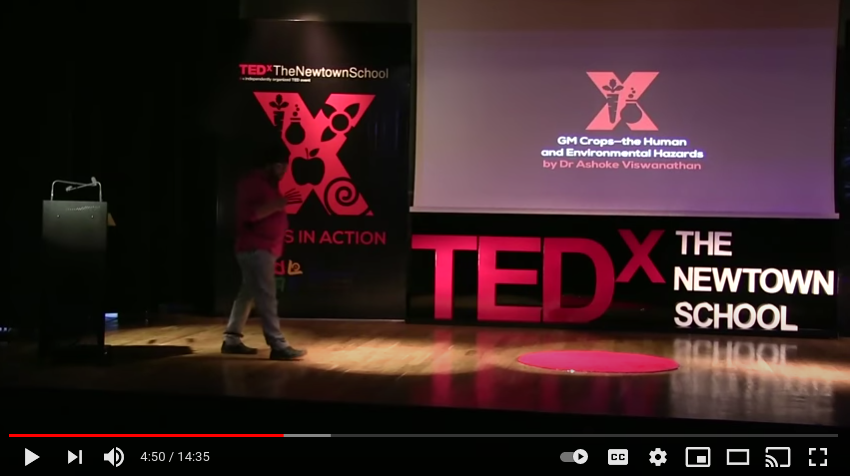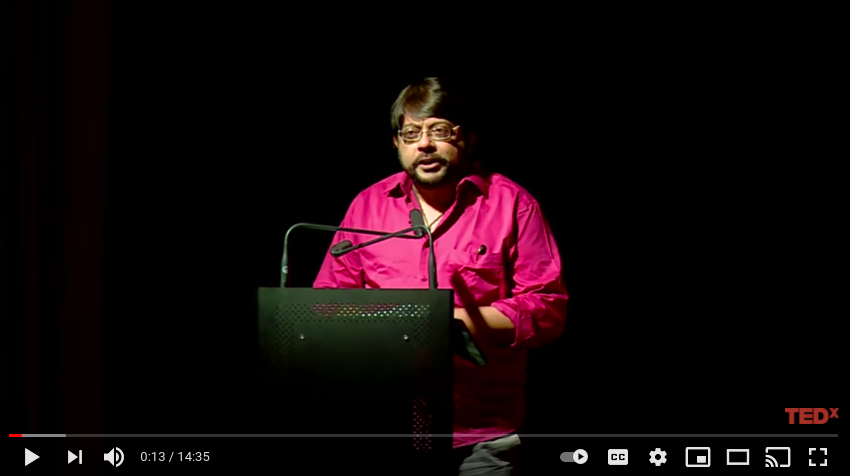Steve Marsh was an Australian farmer who lived just southeast of Perth. He planted oats and rye primarily, but he also raised sheep. He was doing a good job until he saw his sheep were dying and his plants were rotting. He alleges that his former friend Michael Baxter damaged his fields by planting GMOs, which caused his sheep to die. He filed a lawsuit against Baxter for a total of $85,000. Steve is still on the lookout for the land he’s lost. Dr. Ashoke Viswanathan has conducted an extensive study on genetically modified organisms (GMOs) and their impacts on humans and the environment. He gave a TED Talk about the several reasons why GMOs are detrimental.

“They are unhealthy and sampling has proved that they could cause unhealthy situations where you become infertile” (3:09)
GMOs can make you infertile, which means you won’t be able to reproduce. “A meta-analysis that evaluates publications between 1973 and 2011 indicated an average sperm count decline of 50-60 percent,” Parisa Keshani wrote in The Scientific World Journal. In the same article, it is said that since the introduction of GM plants to the market, infertility rates have increased, “As the potential for GM plant production emerges, people face a greater risk of infertility.” “GMO residue of soybeans crushed to make soy oil has made its way into Chinese diets, reportedly causing birth abnormalities, depression, infertility, and a long list of other afflictions,” according to the Wall Street Journal. Because of the impact on its people and future generations, China has begun to phase out the production of GMO crops. “Infertility rates are greater, as are early births, low birth rates, and infant mortality rates.” This article covers how kids are born prematurely and/or have complications throughout the birthing process.
“Could also cause gastrointestinal disorders” (3:26)
It may also cause gastrointestinal problems in addition to infertility. Which is defined as “any ailment or disease affecting the gastrointestinal system (also known as the GI tract).” “In the gastrointestinal (GI) tracts, gene transfer has been observed,” but many investigations have found that bacteria and disease have invaded the gastrointestinal tract and that this has much to do with GM crops. An experiment was conducted to determine whether a GMO probiotic lingered in the GI system or not. “The plasmid was found in 69 percent of GMO probiotic isolates from the GI tract,” says the study. “The GMO carriage has risen after 28 days of probiotic feeding,” and the research continued to demonstrate that GMOs were causing bacteria to linger in the GI system once the testing was extended. Different regions of the gastrointestinal tract transfer more than others, “In vivo gene transfer rates are higher than in vitro gene transfer rates.”
“They contaminate permanently…the footprint is laid” (3:32)
You can’t change something’s genes back once they’ve been changed. Especially if it begins to spread widely. Returning to Steve Marsh, he claimed that his neighbor planted GM crops and transferred them to his field, causing him to lose “nearly 70% of his farm.” “All crops are at risk of contamination, but seed crops are more vulnerable since the GM DNA in the seed will also be carried over to the food crop,” but if GMOs are present, every crop is at risk of contamination. Especially the seeds, because there is no going back once you modify the crop/plant from the start. Crop contamination can occur in a variety of ways. Pollen is one of the most used methods, “Pollen from GM crops can go to organic crops and pollinate them.” Contamination of GM crops is a challenging scenario to navigate because it’s impossible to distinguish between a modified and organic crop. “It’s possible that farmers are unaware that a new experimental crop is being trialed near their farm,” but when it comes to the spread of GMOs via pollen, it’s clear that farmers harvesting organic crops may be harvesting modified crops and have no idea.
Expert: “Doctor” Ashoke Viswanathan
“Doctor” Ashoke Viswanathan stated categorically that he’s not a doctor, but that he had conducted extensive research from reliable sources to support his claims. There was very little information available about this “expert.” He “graduated from the Film and Television Institute of India with a degree in film direction.” “Viswanathan is currently Professor and Head of Department of Producing For Film and TV Specialisation and Dean,” according to Wikipedia, and “he has made award-winning features and documentaries, including the 2014 films ‘The Lighthouse’ and ‘The Ocean and The Sea.’” You shouldn’t believe him if he says he isn’t a doctor yet speaks about your health and how scientific crops influence your body. Because he hasn’t earned a degree in science or health, you should assume he isn’t a trustworthy source of information.

“Biodiversity is affected…if you overdo it, you interfere and cause irreparable damage” (5:50)
Biodiversity is defined as “the diversity of life on Earth at all scales, from genes to ecosystems.” If you change a gene in the environment, it will stay the same way you changed it. “If you modify the organisms, won’t it damage our biodiversity?” a local farmer in Nyankpala wondered. “I can assure you that if there is any crop or product that will help preserve our environment’s biodiversity, it is GMO products.” Dr. Emmanuel Chamba stated this. He works as a plant breeder and is based at the Savannah Agric Research Institute. “By increasing yields, GM crops can also assist in protecting biodiversity.” Yields are essentially reducing the need to convert forests and wetlands into agricultural areas. GMOs aided in the preservation of forests and wetlands from conversion to farming land. “The goal of GM is to boost production… we should embrace technology,” panelist Abdul Rahman Dobea remarked. Dobea believes that scientists were the ones who came up with the concept of changing crops to benefit and improve ourselves. They recognized an issue and sought to resolve it. GMOs are now being used to solve the problem.
Conclusion
Genetically modified organisms (GMOs) are tremendously harmful to the environment. It changes the original crop into something completely different that may never be altered back, but the concept of assisting people in getting the most out of their product by increasing its size or quantity is appealing. “When GM crops contaminate your crops, you get nothing in return,” Steve Marsh said testifying in court.
Featured Image: Photo by Alejandro Barrón from Pexels
Video: https://www.youtube.com/watch?v=2uPjha9ABQg
Pictures via video: https://www.youtube.com/watch?v=2uPjha9ABQg

